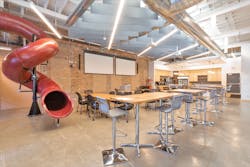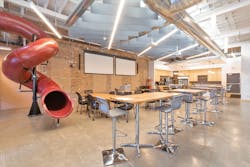DMC founder Frank Riordan answers our 7 questions
DMC’s founder and CEO Frank Riordan was recently named as a finalist for Ernst & Young Global's 2019 Entrepreneur of the Year for the Midwest regional program, which includes Illinois, Indiana and Wisconsin. DMC is a project-based engineering consulting firm focused on software development and control systems.
The program, which aims to recognize the work and accomplishments of those who create the products and services that drive the world economy, was founded in 1986 and now includes more than 145 cities and 60 countries worldwide.
Frank Riordan answered 7 questions about the organization and how technology is affecting the industry.
What are three key things that a machine builder, system integrator or manufacturer should know about your company?
We don't build anything; we work with partners and customers to build things. DMC is a project-based engineering consulting firm focused on software development and control systems.
We're not limited to one industry. Our broad engineer base spans a range of industries and technologies from offices in eight cities around the country. Our diverse experience allows us to leverage best practices from many fields.
DMC is known for our employee recruiting and training process. Our #1 core value is to hire smart people, and we are heavily invested in finding and retaining top talent. Our team can solve difficult problems, and we hear we're fun to work with.
2. What new technologies are driving your product development and why?
DMC doesn't develop traditional products. We are always excited to utilize the latest technologies to deliver solutions that provide better performance for controls, data collection, and data analytics. We've been implementing interconnectivity between machines and production lines for a long time, and we see that interest in IoT, cloud storage, AI, and communicating with industrial equipment only continues to grow.
3. How does the Industrial Internet of Things figure in your business strategy?
DMC has been working in IIoT since before it was called that, at least ten years. We are seeing that our clients are more interested than ever in utilizing current technologies to expand their manufacturing capabilities.
We do quite a bit of IoT business between our embedded and product development, application development, and cloud practices. We work on many systems and devices that send data to the cloud with applications and dashboarding to provide information for them. We're even seeing a fair amount of this in our industrial automation practice.
We have some OEM clients deploying web-enabled systems around the world, not to the production floor but at remote sites. The IoT cloud approach can be a cost-effective way for our OEMs to monitor these systems for their end clients and collect metrics to help them improve over time.
How will machine automation and controls alter the way companies staff their operations in the future?
Automation allows for simpler interaction with machines and processes, but will require a more software-oriented technical team to maintain. With more complex back ends, we can make more simple and robust front ends.
How is the development of software solutions impacting your requirements for hardware?
People are expecting more and more out of hardware. You can do much more on some PLC platforms than you could 10 or 15 years ago. For IoT systems, we're putting more control on every device as capabilities continue to expand.
It's driving us towards hardware platforms that are capable of higher level, object-oriented programming. It allows us to develop more efficiently by writing reusable code and libraries. It also allows us to put more of the intelligence for doing things like talking to databases or the cloud into the PLC itself. In the industrial automation world, we need PLC, HMI and SCADA platforms that can handle more sophisticated programming paradigms.
As engineering and IT continue their convergence, which one is and/or will be leading the direction of future automation and technology at your organization?
We've seen collaboration between engineering and IT professionals growing on the automation factory floor for at least 15 years. Some of our manufacturing clients are now looking to move beyond their local servers to the cloud. Many of our clients are also interested in collecting metrics for OEE to stay competitive in the global marketplace.
To continue progressing, engineers will become more IT-oriented and IT professionals will be more in tune with manufacturing operations technologies to address concerns around cybersecurity and safety.
Looking into the future, how will technology change your company over the next five years?
We love learning about new technologies and how to use existing technologies in novel ways to solve problems. We're constantly evaluating new technologies to explore how they can serve our manufacturing clients.




